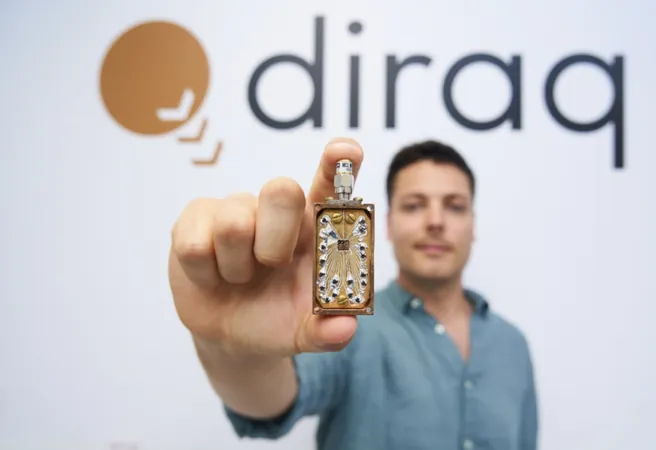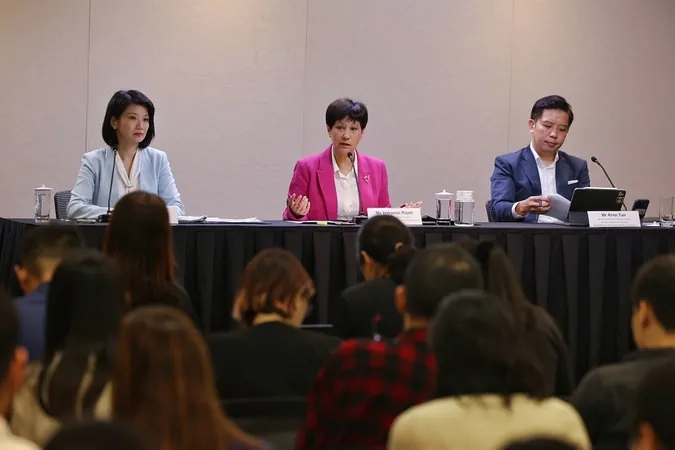
Breakthrough Study Reveals Secrets Behind Spin Qubit Processor Errors – Quantum Computing's Future in Silicon!
2024-10-14
Author: Jia
Introduction
In an exciting development for quantum computing, researchers at Diraq, a Sydney-based company specializing in quantum hardware, alongside the University of New South Wales (UNSW), have made significant strides in understanding the origins of errors in spin qubit processors. Their groundbreaking findings, recently published in *Nature Physics*, shed light on the performance challenges linked to high-fidelity entanglement in silicon-based quantum systems.
The Challenge of Quantum Computing
Quantum computing has the potential to revolutionize our digital landscape, promising faster processing capabilities that can solve complex problems currently out of reach for classical computers. However, achieving reliable entanglement between qubits—essential for quantum operations—has been hampered by the susceptibility of solid-state platforms to errors. These errors adversely affect qubit coherence, impacting overall computational performance.
Insights from Diraq's Research
Andrew Dzurak, CEO and Founder of Diraq, emphasized the pivotal role of silicon in the evolution of technology: 'The 21st century has revolved around computerization thanks to the semiconducting silicon chip. Our mission is grounded in the idea that silicon could also serve as the backbone for the first fault-tolerant quantum computer.' The researchers at Diraq are leveraging established manufacturing processes developed for silicon transistors, ensuring high precision and reliability in building quantum technologies.
Investigating Spin Qubit Errors
The research delves into the fundamental nature of errors found within silicon quantum dot processors. Dzurak and his colleagues utilized advanced diagnostic techniques, including Interleaved Randomized Benchmarking (IRB), Gate Set Tomography (GST), and Fast Bayesian Tomography (FBT), to probe the behavior of quantum states and logic gates. Each technique contributes uniquely, allowing researchers to gain a deeper understanding of both the quantum system's performance and the noise factors that compromise gate fidelity.
Significant Findings
In an exciting twist, the scientists discovered that the combination of these methodologies yielded a treasure trove of data, enabling them to identify specific noise sources affecting the operation of entangling gates. Importantly, they reported achieving operational fidelities exceeding 99%, which represents a critical step towards creating robust, scalable quantum computers.
Implications for the Future
The implications of this research are far-reaching. 'Our results demonstrate the feasibility of using silicon transistor technology as a foundational element for future utility-scale quantum computers. Enhancing our understanding of error sources not only opens the door to improving current devices but also allows us to scale our systems more effectively,' Dzurak commented.
Next Steps for Diraq
As the team at Diraq prepares to push the envelope of their research, they aim to take their spin qubit processors out of the laboratory and into semiconductor foundries for further testing. They are also contemplating innovative materials and control methods to enhance operational fidelity even more.
Conclusion
With ambitions to increase the number of qubits on a single chip, the Diraq team is poised to contribute vital advancements to quantum computing, leveraging the reliability of silicon technology. For those intrigued by the future of computational power, the race toward scalable quantum computers, powered by silicon, might just hold the key to unlocking unprecedented technological advancements.
Watch this space as researchers continue to unravel the complexities of quantum computing—this isn’t just a revolution; it’s a quantum leap forward!





 Brasil (PT)
Brasil (PT)
 Canada (EN)
Canada (EN)
 Chile (ES)
Chile (ES)
 España (ES)
España (ES)
 France (FR)
France (FR)
 Hong Kong (EN)
Hong Kong (EN)
 Italia (IT)
Italia (IT)
 日本 (JA)
日本 (JA)
 Magyarország (HU)
Magyarország (HU)
 Norge (NO)
Norge (NO)
 Polska (PL)
Polska (PL)
 Schweiz (DE)
Schweiz (DE)
 Singapore (EN)
Singapore (EN)
 Sverige (SV)
Sverige (SV)
 Suomi (FI)
Suomi (FI)
 Türkiye (TR)
Türkiye (TR)